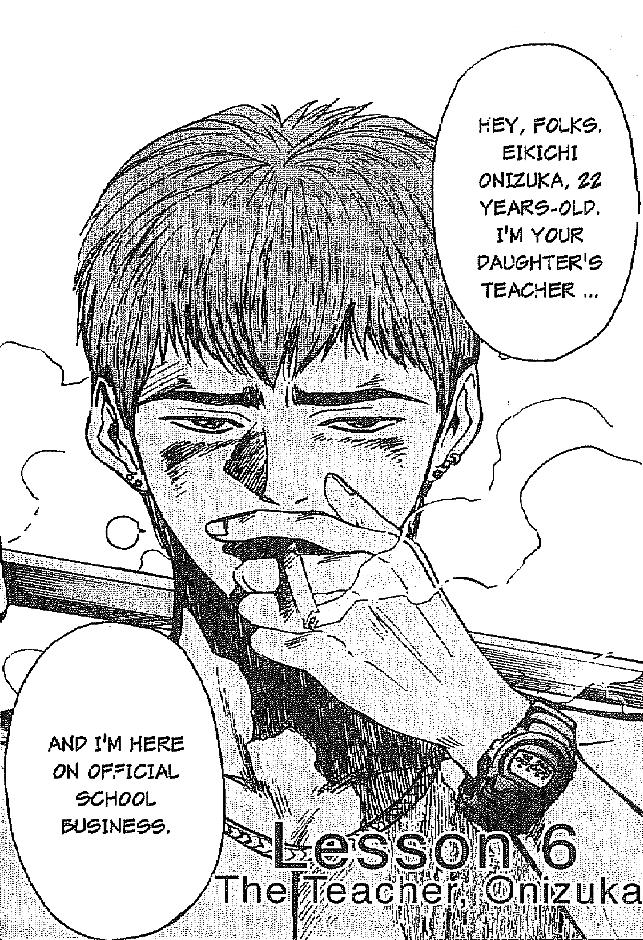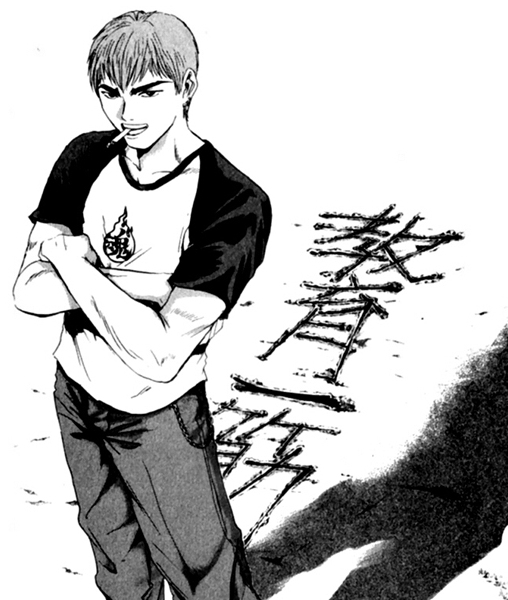Great Teacher Onizuka
by Martin Skidmore 30-Jan-11
Tohru Fujisawa’s series is some of the best entertainment to be had in comics. The story is about a tough but dumb young punk becoming a teacher, sure he will be a great teacher, despite his ignorance and stupidity. And the point is, he is, even if his main motivation is schoolgirl pussy.
Tohru Fujisawa’s series is some of the best entertainment to be had in comics. The story is about a tough but dumb young punk becoming a teacher, sure he will be a great teacher, despite his ignorance and stupidity. And the point is, he is, even if his main motivation is schoolgirl pussy. Basically what we have here is a comic that is the total opposite of Dead Poets Society in almost every way.
 I mentioned in a recent review of Barry Ween that occasionally there is a moment in a comic that not only makes you realise that you are hooked and in love with it, but that sums up its appeal exceptionally well. Here the start of book 2 (of 25) does that job (sorry about the quality of the scan – it’s a bit better if you click on the image): a family has just opened the door. There stands a hot young man (Onizuka), no shirt, cigarette in his mouth, sledgehammer slung across his shoulders. “Hey, folks. Eikichi Onizuka, 22 years-old. I’m your daughter’s teacher… And I’m here on official school business.”
I mentioned in a recent review of Barry Ween that occasionally there is a moment in a comic that not only makes you realise that you are hooked and in love with it, but that sums up its appeal exceptionally well. Here the start of book 2 (of 25) does that job (sorry about the quality of the scan – it’s a bit better if you click on the image): a family has just opened the door. There stands a hot young man (Onizuka), no shirt, cigarette in his mouth, sledgehammer slung across his shoulders. “Hey, folks. Eikichi Onizuka, 22 years-old. I’m your daughter’s teacher… And I’m here on official school business.”
He has just got a job at an elite private academy, despite beating up the headmaster both before and after his interview: the way that Fujisawa sells this implausible circumstance is one of the keys to the whole story. Much of the plot for the rest of the 5,000 pages is to do with his finding ways to keep his job despite completely outrageous behaviour: wrecking the head’s car repeatedly, stripping the 16 year old daughter of the head of the PTA to take naked photos of her, spending the school trip funds on drink and hookers, and much, much more. Every time, Fujisawa finds a way to save his job. The other major plot motor is his dealings with the problem class he has handled, who have destroyed a series of teachers before him (we don’t really learn why until volume 23). There is also the odd big-action storyline – gangsters kidnapping a pupil, someone kidnapping his only friend among the other teachers, and then right at the end Onizuka has a brain aneurysm, and any blow to the head could kill him. One of the head’s stooges therefore leads a huge gang of bikers with baseball bats to ambush him outside the hospital.
All of this is handled with a daringly wild and extreme humour, constantly going beyond anything you could expect. Fujisawa generates excitement and comedy through the wreckless and ridiculous events, through Onizuka’s stupidity and desperate efforts to get laid, and through a density of dialogue I don’t think I’ve ever seen in a comic of any kind – this is particularly striking in a manga, where dialogue is always far sparser than in the great majority of Western comics. You need good eyesight for this series: there are lots of sequences with many characters speaking in the backgrounds of scenes, countless tiny speech bubbles in very small print.
Fujisawa also gives us the best story-so-far intros I have ever seen, no contest. I can’t resist quoting the one from volume 14 in full:
Dear Sirs,
My name is Eikichi Onizuka, homeroom and social studies teacher for Sophomore Class Four at Holy Forest Academy in Kichijoji just outside of Tokyo. I am writing to you in reference to my application for acceptance in the Japan’s Greatest Teacher competition you are currently holding for teachers in Japan who have demonstrated greatness in the arena of teaching students good. How are you? I understand that teachers that enter the competition are supposed to be nominated by a student, but so far none of my students have submitted a nomination for me yet, and I’m sure it’s just a mistake. They’re probably dropping tabs or getting knocked up or something that keeps them from nominating me. I was hoping that you could make an exception from me and accept this letter as a nomination submission. If you need to slap a student’s name on it to get around the rules then just say it’s from Kunio Marai. He’s one of my students who was a little shit when I first started teaching. But his mom’s a wicked hot foxy baby and, after numerous parent/teacher conferences, the kid really came around. But he’s not a very good student. Is that important? Does the kid that nominates me have to be a good student? Well, if so, say this nomination is from Kikuchi Yoshito. He’s a smart guy, Check it out. I needed to get some composites made you know, putting the heads of girls you know on named bodies from porn mags and he whipped them out in a night. They were perfect. You couldn’t even tell they were fake. Or do you need a student who looks at me like a father figure, or a big brother, or a priest or something? Yeah, use Noburu Yoshikawa. That’s spelled N-O-B-U-R-U Y-O-S-H-I-K-A-W-A. Got that? The kid was a pants peeing loser until I came on the scene. Now he’s talking to people, getting real social he even might have had a little pas de deux (yeah, I speak French) with a sweet piece of ass from Class Four named Anko Uehara on our class trip to Okinawa, which I promised to the kids when I accidentally spent all their class trip money on strippers and booze. But, you know what, Noburu has tried to commit suicide like a hundred times. Maybe don’t use him because he’s a nutcase. Let’s see, maybe Miyabi, but she’s such a little bitch. Urumi’s a possibility, but she ditched class the first three months of school, something I do not condone. Tomoko’s too busy getting exploited by the Japanese media machine for her gargantuan gazongas. Well, maybe you don’t need to say my nomination came from a student. I believe that my word and reputation speak for themselves. I am the greatest teacher in all of Japan and I want to enter this contest to officially assume a title that is rightfully mine already. Thank you for your time and I’ll see you at the finals.
Sincerely yours.
Eikichi “Fists of Death” Onizuka
 What takes it beyond just ludicrous entertainment (not that I would want to neglect such a magnificent example of that) is a genuine intelligence and sophistication among all the crudeness. Onizuka reaches and converts his pupils in all kinds of ways, none of them by inspiring them through the beauty of poetry or anything remotely like that. He’s more likely to strap one to the front of a motorbike and take her on a ride that would terrify the most crazed Hollywood stuntman, leaping off unfinished flyovers and the like. But he always does reach them – sometimes the dealings with one pupil will be the central story for hundreds of pages (one story takes 166 pages from Onizuka setting off to stop a pupil killing herself to the moment he gets to where she is), and every one of these interactions is different and original and, crucially, believable, amongst all the outrageous and comedic happenings.
What takes it beyond just ludicrous entertainment (not that I would want to neglect such a magnificent example of that) is a genuine intelligence and sophistication among all the crudeness. Onizuka reaches and converts his pupils in all kinds of ways, none of them by inspiring them through the beauty of poetry or anything remotely like that. He’s more likely to strap one to the front of a motorbike and take her on a ride that would terrify the most crazed Hollywood stuntman, leaping off unfinished flyovers and the like. But he always does reach them – sometimes the dealings with one pupil will be the central story for hundreds of pages (one story takes 166 pages from Onizuka setting off to stop a pupil killing herself to the moment he gets to where she is), and every one of these interactions is different and original and, crucially, believable, amongst all the outrageous and comedic happenings.
It’s that tempering with real insight and sensitivity, the potent emotional tension that he creates and manages so well, that moves this into territory superior to just entertainment; but when it comes down to it, it’s the latter that makes this exceptional. I don’t know that I have ever read a more entertaining comic series, in terms of excitement and humour. The fact that he can blend this with the more intelligent emotional content is extraordinary, especially as these are often not separated but part of the same events at the same moments – it reminds me a little of Buffy in that respect, the ability to do multiple different kinds of things at the same time.
He executes all of this with a sharp art style that can distinguish a large cast, most in school uniform so not separable by what they wear, that can express the fullest range of emotions, that can wring every ounce of excitement out of the physical dramas and conflicts, and that times a joke perfectly. This is an absolutely magnificent comic, and one that anyone, comic fans or not, will enjoy immensely.
MAJOR WARNING: avoid GTO: The Early Years at all costs. I’ve rarely been so disappointed in a comic – and I’d already bought three double-sized volumes of it because it would surely be of comparable quality. The covers certainly look like Fujisawa’s work, but the insides suggest other hands are responsible: the writer doesn’t get the personalities right, has a tin ear (which I suppose may be down to a different translator), no sophistication and no wit. The artist is crude on page and panel composition, has a clumsy and often amateurish art style, much simpler and more exaggerated than Fujisawa. I am just about prepared to believe that maybe Fujisawa was in the same room as the makers of this at some point in its production, but there is no detectable involvement beyond the cover. Dreadful in comparison, though there is some decent character development (less of Onizuka than his best friend and some women and girls) here and there.
Tags: Great Teacher Onizuka, GTO, Manga, Tohru Fujisawa